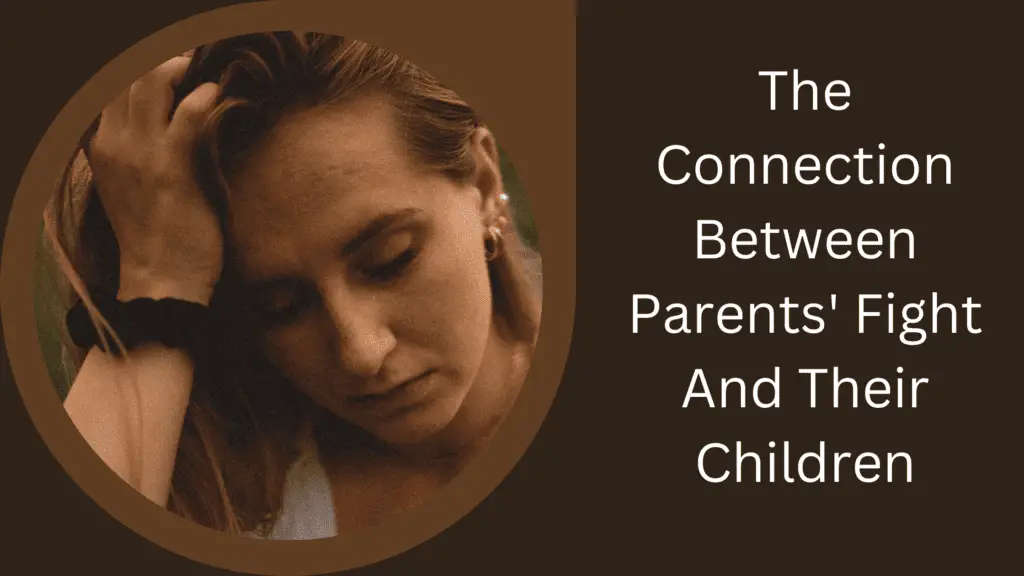Growing up, I witnessed my fair share of heated arguments and tearful confrontations between my parents. As a child, the sight of my parents fighting and crying was both distressing and confusing. I couldn’t fully grasp the reasons behind their disagreements or the emotions that fueled them. However, what struck me the most was how instinctively I would burst into tears whenever I saw them in conflict.
Over time, I realized that I was not alone in experiencing this reaction. Many children, like me, find themselves shedding tears when their parents engage in intense disputes. This phenomenon begs the question: “Why do I cry when my parents fight?”
Why Do I Cry When My Parents Fight
It is not uncommon for children to cry when their parents fight. Upon reflecting on that experience, I have finally got the answer to the question: why do I cry when my parents fight? These reasons are five and they are pretty straightforward. The reasons for was crying because of emotional distress, fear of separation or loss, empathy and concern, feeling caught in the middle and finally the sensitivity to conflict.
Reason 1: Emotional Impact
Your emotional connection with your parents is profound and intricate. Since birth, you have developed a deep bond with your caregivers, relying on them for love, support, and a sense of security. This connection forms the basis of your emotional well-being and shapes your understanding of relationships. When your parents engage in heated arguments, it triggers a range of intense emotions within you.
One primary emotion you experience in such situations is fear. Witnessing your parents’ conflict creates a sense of instability and uncertainty, causing you to worry about the stability of your family unit. The overwhelming fear of your parents separating or losing the love and attention of one or both parents weighs heavily on you. Sadness is another common emotion that arises when your parents fight. Seeing your parents in distress and witnessing their tears is deeply upsetting. You often empathize with their pain and may feel profound sadness at the sight of their emotional turmoil.

In some cases, you might even internalize the blame for your parents’ arguments, mistakenly believing that your actions or existence are the cause of their discord. This misplaced sense of responsibility burdens you with guilt and self-blame. For example, if your parents argued over financial matters after you requested a new toy or an expensive item, you may start believing that your desires are causing strain in their relationship. Consequently, you end up crying whenever your parents fight.
Reason 2: Sense of Security
Frequent or intense arguments between your parents can severely threaten your sense of security. Your home, which should ideally be a safe haven, suddenly becomes a source of turmoil and unpredictability. This disruption to your sense of security has profound effects on your emotional well-being and overall development.
For you, your parents are not just individuals; they are the foundation of your world. When your parents argue, it can feel as if your world is falling apart. The stability and harmony you once knew seem shattered, leaving you feeling lost and vulnerable. The familiar and comforting environment you rely on becomes tainted by tension and conflict.
Imagine a scenario where you overhear your parents shouting at each other in the next room. You may experience a flood of emotions—fear, sadness, and confusion. You may feel as though your once safe and secure home is now a place of chaos. The very foundation of your world feels unstable, and you may struggle to make sense of the upheaval. Moreover, you may feel like you have no control over the situation. Helplessness sets in as you witness your parents’ arguments escalate, unable to intervene or resolve the conflict. This lack of control can exacerbate your feelings of insecurity and contribute to a sense of powerlessness. Consequently, the loss of your sense of security may lead you to burst into tears.

Reason 3: Coping Mechanisms
Another answer to the question: Why do I cry when my parents fight? Is crying being a coping mechanism. When confronted with the distressing experience of your parents fighting, you often develop coping mechanisms to navigate your overwhelming emotions and regain a sense of stability. These coping mechanisms vary from child to child, but they generally serve as strategies to manage the stress and anxiety caused by parental conflict.
Crying is one of the most common coping mechanisms you resort to when your parents fight. It is a natural response to overwhelming emotions, providing a temporary release of tension and pent-up feelings. Tears allow you to express your sadness, fear, and frustration, serving as an outlet for your emotional distress.
Seeking comfort from others is another commonly employed coping mechanism by children in such situations. You may turn to siblings, friends, or other trusted adults for support and reassurance. By seeking emotional connection outside the immediate conflict, you attempt to find a sense of stability and security. In most cases, crying becomes the easily available coping mechanism for children.
Reason 4: Emotional Distress
Witnessing your parents argue can be emotionally distressing. Seeing the people you love and depend on engage in conflict can overwhelm you with intense feelings of sadness, fear, and helplessness. The emotional weight of the situation may become too much to bear, and crying can be a natural way for your body to release and express those emotions.

Reason 5: Fear of Separation or Loss
When your parents argue, it’s natural to worry about the stability of your family and the potential for your parents to separate or divorce. The fear of losing the secure and loving environment you’ve known can be deeply unsettling. This fear triggers a strong emotional response, leading to tears as a way to cope with the anxiety and uncertainty about the future.
Reason 6: Empathy and Concern
As a child, you naturally care about the well-being of your parents. When you see them arguing and in pain, you may feel empathy and concern for their emotional state. Witnessing their conflict can evoke a sense of compassion, and crying can be a way to express your caring and concern for them, even if they are the cause of the conflict.
Read About: Why do my parents hate me but love my siblings
Reason 7: Feeling Caught in the Middle
Yes, being caught up in the middle might be the answer to: Why do I cry when my parents fight? Arguments between parents can make you feel caught in the middle of their dispute. You may feel torn between taking sides or trying to resolve the situation, even though it’s not your responsibility to do so. This internal conflict can generate emotional turmoil as you grapple with conflicting loyalties or a desire to restore harmony. Crying can be a natural response to this inner struggle.

Communication and Support
Communication and support are crucial when it comes to children who witness their parents fighting. It’s important to emphasize the significance of open communication and provide support to help them navigate these challenging situations. Here are some steps you can take:
- Encourage parents to have age-appropriate conversations with their children about their arguments. They should explain that disagreements are a normal part of relationships and reassure them that they are not to blame for the conflicts. This helps children understand that the issues between their parents are separate from their relationship with their parents.
- Provide reassurance and emotional support: Children need to be reassured that their parents’ love for them is unaffected by the arguments. Encourage parents to express their love and support explicitly, highlighting that the conflicts are between them and not caused by the child. Assure the child that their well-being is a priority and that their parents are there to support and protect them.
- Validate their feelings: It’s essential to validate the child’s emotions and let them know that their feelings are normal and valid. Encourage parents to create a safe space where the child can openly express their emotions without fear of judgment. Active listening and empathy can go a long way in helping the child feel heard and understood.
- Monitor emotional distress: Keep an eye on the child’s emotional well-being. If their distress persists or intensifies despite efforts to address the situation, it may be beneficial to seek professional help. A therapist or counselor experienced in working with children can provide guidance and support to help the child cope with their emotions effectively.
Read About: Psychological Effects of Yelling at a Child
Conclusion
Witnessing parents fight can evoke a wide range of intense emotions in children, often leading to tears. It is crucial to understand that crying is a normal response to the overwhelming feelings that arise from these conflicts. However, parents play a vital role in helping their children cope with the emotional impact of parental discord.
Open communication is key. Parents should initiate age-appropriate conversations with their children, assuring them that they are not to blame for the arguments and that conflicts between adults are a natural part of relationships. By actively listening, validating their emotions, and providing reassurance, parents can create an atmosphere of understanding and support.
The takeaway is clear: while it is normal for children to cry when their parents fight, parents can help by communicating openly, providing support, and seeking professional help when necessary. By prioritizing their children’s emotional well-being, parents can create an environment that nurtures resilience, fosters understanding, and strengthens the bonds within the family unit.







